Healthcare Manager Interview: Professionalism, Leadership, Advocacy
VerifiedAdded on 2020/05/28
|5
|1027
|42
Homework Assignment
AI Summary
This assignment presents an interview with a healthcare manager, delving into their multifaceted role within a healthcare organization. The manager discusses their responsibilities, including policy decisions, patient care oversight, budgeting, and marketing. The interview explores the manager's definition of professionalism, emphasizing ethical standards and a commitment to patient safety, while addressing cost-containment strategies. The manager reflects on leadership, change management within the healthcare setting, and strategies for ensuring quality care through clinical audits and risk assessments. The discussion includes challenges faced, such as adapting to change and handling potential miscommunications. The manager also details efforts to control diseases and promote wellness through infection control measures and staff education. The document also cites references related to healthcare management and leadership.
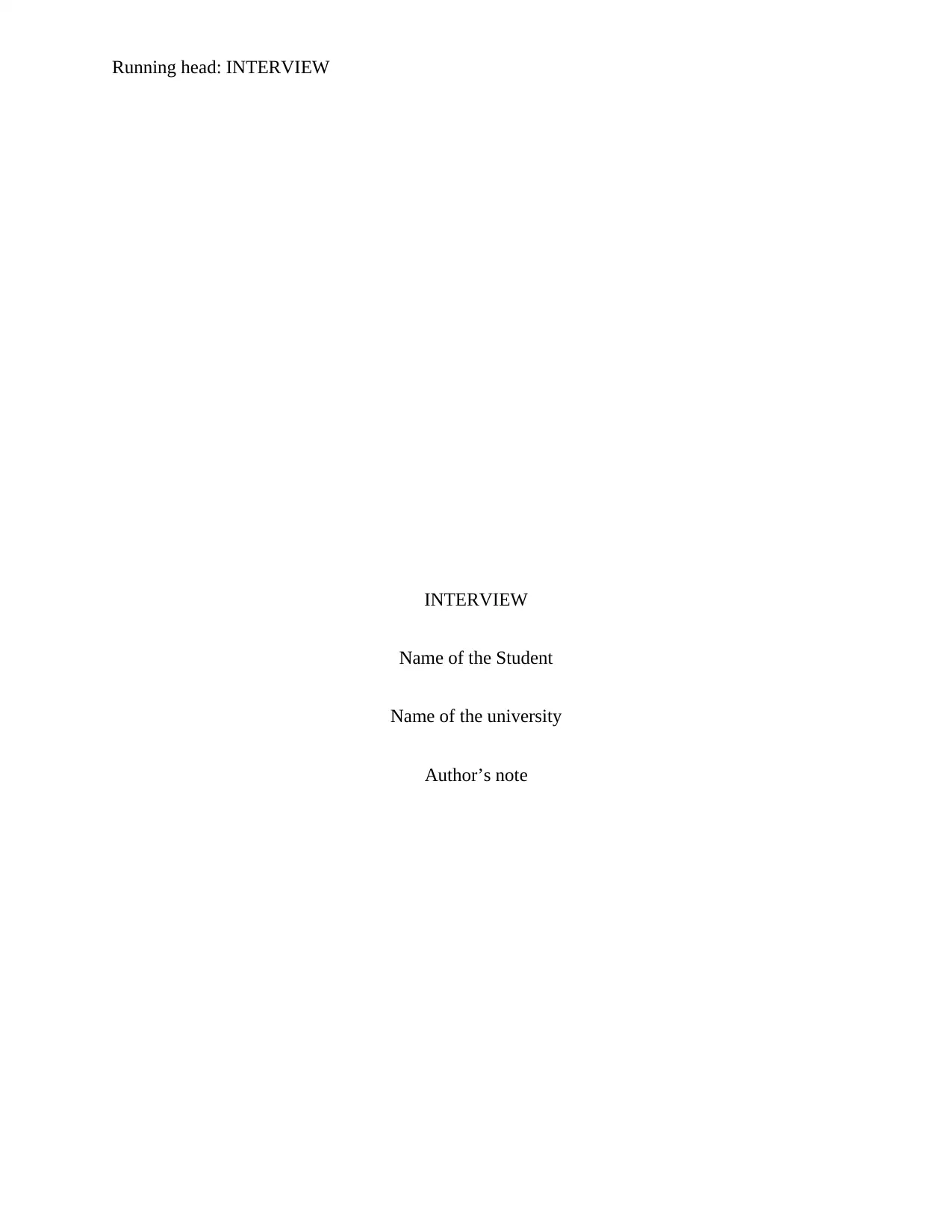
Running head: INTERVIEW
INTERVIEW
Name of the Student
Name of the university
Author’s note
INTERVIEW
Name of the Student
Name of the university
Author’s note
Paraphrase This Document
Need a fresh take? Get an instant paraphrase of this document with our AI Paraphraser
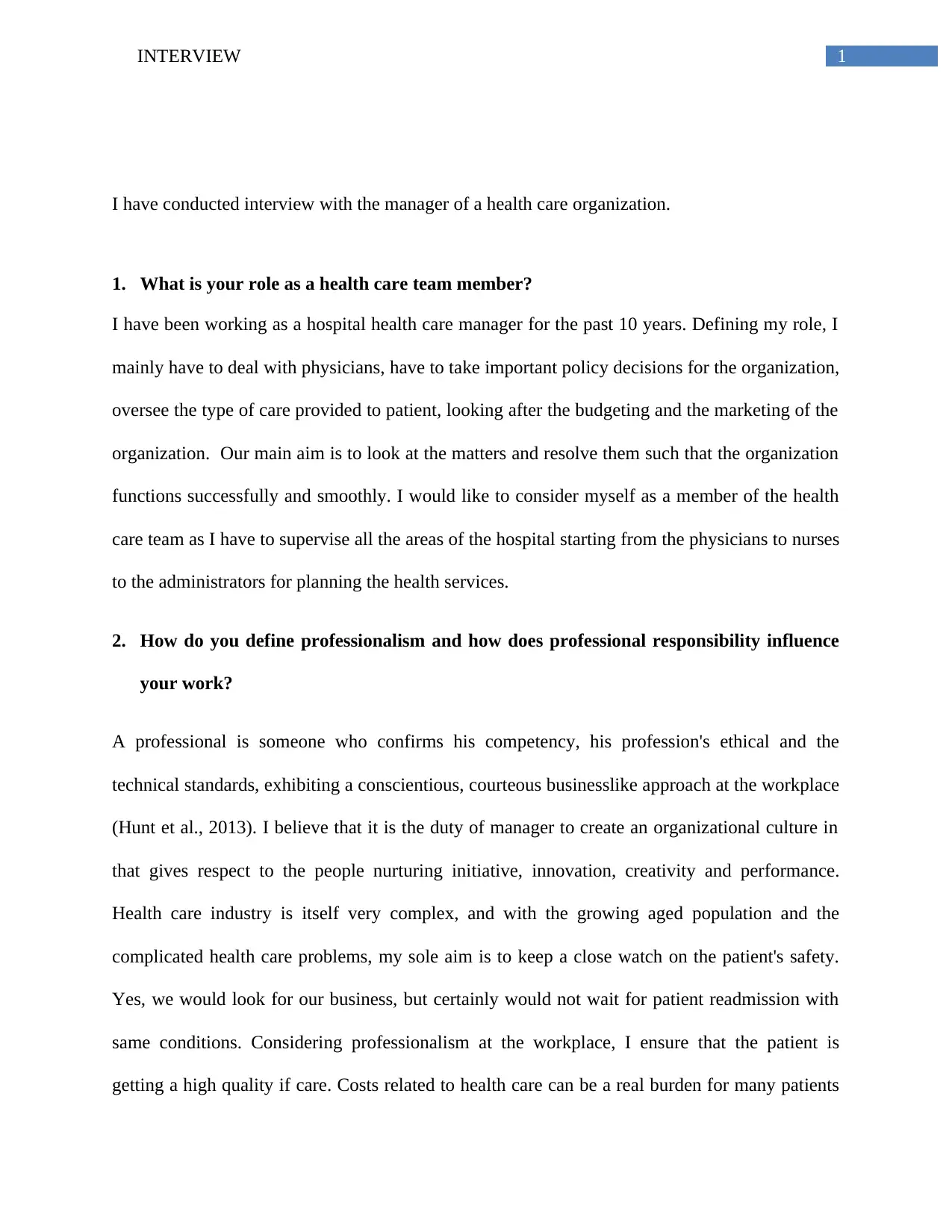
1INTERVIEW
I have conducted interview with the manager of a health care organization.
1. What is your role as a health care team member?
I have been working as a hospital health care manager for the past 10 years. Defining my role, I
mainly have to deal with physicians, have to take important policy decisions for the organization,
oversee the type of care provided to patient, looking after the budgeting and the marketing of the
organization. Our main aim is to look at the matters and resolve them such that the organization
functions successfully and smoothly. I would like to consider myself as a member of the health
care team as I have to supervise all the areas of the hospital starting from the physicians to nurses
to the administrators for planning the health services.
2. How do you define professionalism and how does professional responsibility influence
your work?
A professional is someone who confirms his competency, his profession's ethical and the
technical standards, exhibiting a conscientious, courteous businesslike approach at the workplace
(Hunt et al., 2013). I believe that it is the duty of manager to create an organizational culture in
that gives respect to the people nurturing initiative, innovation, creativity and performance.
Health care industry is itself very complex, and with the growing aged population and the
complicated health care problems, my sole aim is to keep a close watch on the patient's safety.
Yes, we would look for our business, but certainly would not wait for patient readmission with
same conditions. Considering professionalism at the workplace, I ensure that the patient is
getting a high quality if care. Costs related to health care can be a real burden for many patients
I have conducted interview with the manager of a health care organization.
1. What is your role as a health care team member?
I have been working as a hospital health care manager for the past 10 years. Defining my role, I
mainly have to deal with physicians, have to take important policy decisions for the organization,
oversee the type of care provided to patient, looking after the budgeting and the marketing of the
organization. Our main aim is to look at the matters and resolve them such that the organization
functions successfully and smoothly. I would like to consider myself as a member of the health
care team as I have to supervise all the areas of the hospital starting from the physicians to nurses
to the administrators for planning the health services.
2. How do you define professionalism and how does professional responsibility influence
your work?
A professional is someone who confirms his competency, his profession's ethical and the
technical standards, exhibiting a conscientious, courteous businesslike approach at the workplace
(Hunt et al., 2013). I believe that it is the duty of manager to create an organizational culture in
that gives respect to the people nurturing initiative, innovation, creativity and performance.
Health care industry is itself very complex, and with the growing aged population and the
complicated health care problems, my sole aim is to keep a close watch on the patient's safety.
Yes, we would look for our business, but certainly would not wait for patient readmission with
same conditions. Considering professionalism at the workplace, I ensure that the patient is
getting a high quality if care. Costs related to health care can be a real burden for many patients
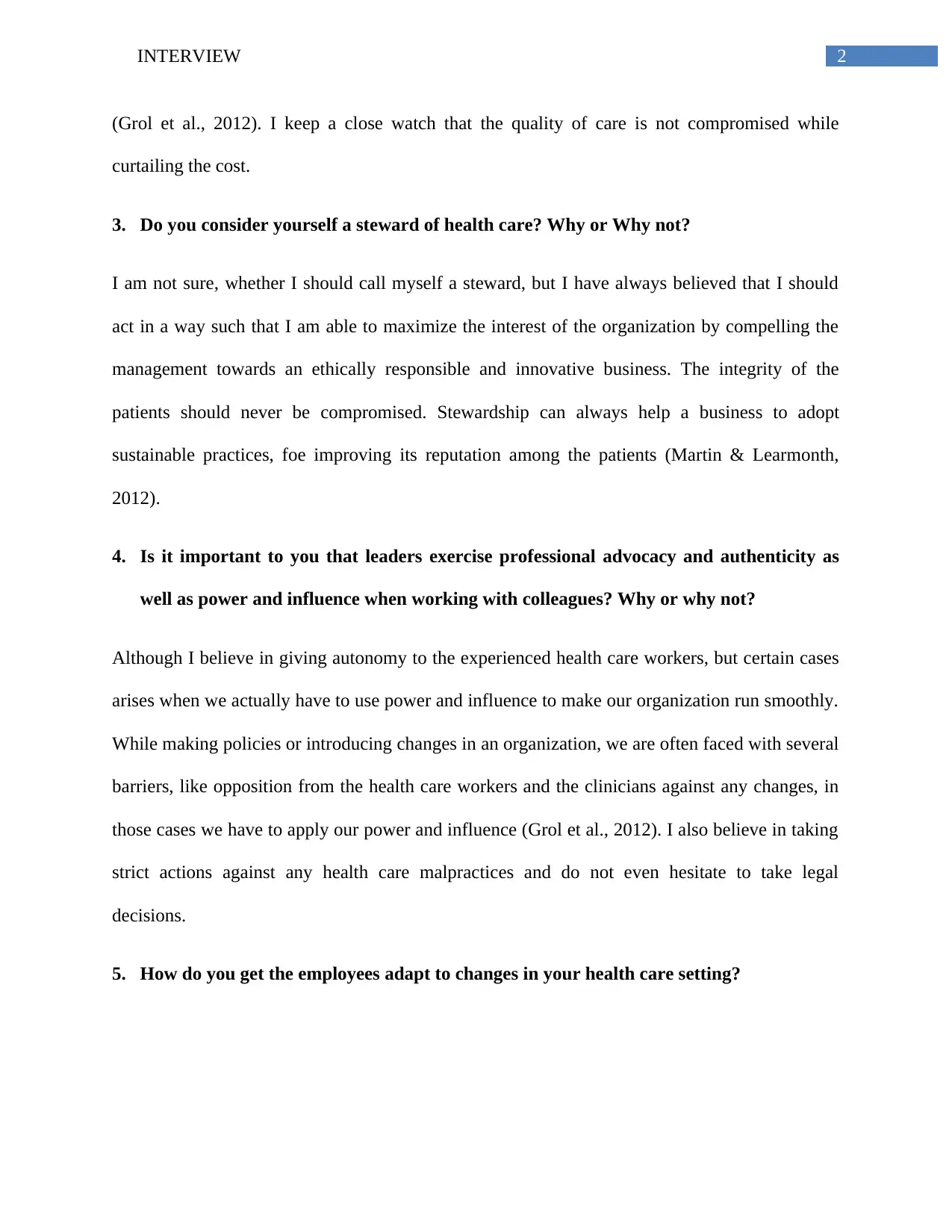
2INTERVIEW
(Grol et al., 2012). I keep a close watch that the quality of care is not compromised while
curtailing the cost.
3. Do you consider yourself a steward of health care? Why or Why not?
I am not sure, whether I should call myself a steward, but I have always believed that I should
act in a way such that I am able to maximize the interest of the organization by compelling the
management towards an ethically responsible and innovative business. The integrity of the
patients should never be compromised. Stewardship can always help a business to adopt
sustainable practices, foe improving its reputation among the patients (Martin & Learmonth,
2012).
4. Is it important to you that leaders exercise professional advocacy and authenticity as
well as power and influence when working with colleagues? Why or why not?
Although I believe in giving autonomy to the experienced health care workers, but certain cases
arises when we actually have to use power and influence to make our organization run smoothly.
While making policies or introducing changes in an organization, we are often faced with several
barriers, like opposition from the health care workers and the clinicians against any changes, in
those cases we have to apply our power and influence (Grol et al., 2012). I also believe in taking
strict actions against any health care malpractices and do not even hesitate to take legal
decisions.
5. How do you get the employees adapt to changes in your health care setting?
(Grol et al., 2012). I keep a close watch that the quality of care is not compromised while
curtailing the cost.
3. Do you consider yourself a steward of health care? Why or Why not?
I am not sure, whether I should call myself a steward, but I have always believed that I should
act in a way such that I am able to maximize the interest of the organization by compelling the
management towards an ethically responsible and innovative business. The integrity of the
patients should never be compromised. Stewardship can always help a business to adopt
sustainable practices, foe improving its reputation among the patients (Martin & Learmonth,
2012).
4. Is it important to you that leaders exercise professional advocacy and authenticity as
well as power and influence when working with colleagues? Why or why not?
Although I believe in giving autonomy to the experienced health care workers, but certain cases
arises when we actually have to use power and influence to make our organization run smoothly.
While making policies or introducing changes in an organization, we are often faced with several
barriers, like opposition from the health care workers and the clinicians against any changes, in
those cases we have to apply our power and influence (Grol et al., 2012). I also believe in taking
strict actions against any health care malpractices and do not even hesitate to take legal
decisions.
5. How do you get the employees adapt to changes in your health care setting?
⊘ This is a preview!⊘
Do you want full access?
Subscribe today to unlock all pages.

Trusted by 1+ million students worldwide
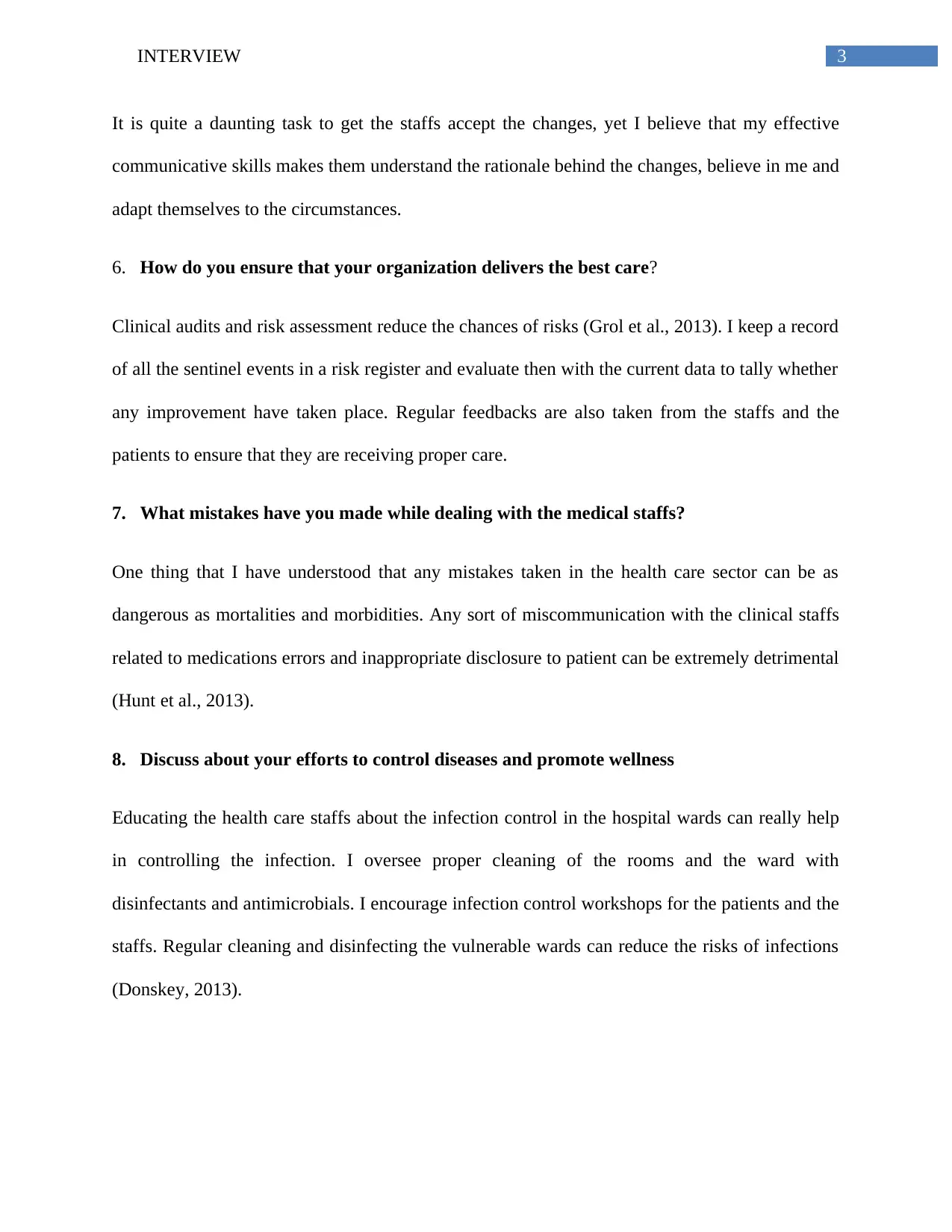
3INTERVIEW
It is quite a daunting task to get the staffs accept the changes, yet I believe that my effective
communicative skills makes them understand the rationale behind the changes, believe in me and
adapt themselves to the circumstances.
6. How do you ensure that your organization delivers the best care?
Clinical audits and risk assessment reduce the chances of risks (Grol et al., 2013). I keep a record
of all the sentinel events in a risk register and evaluate then with the current data to tally whether
any improvement have taken place. Regular feedbacks are also taken from the staffs and the
patients to ensure that they are receiving proper care.
7. What mistakes have you made while dealing with the medical staffs?
One thing that I have understood that any mistakes taken in the health care sector can be as
dangerous as mortalities and morbidities. Any sort of miscommunication with the clinical staffs
related to medications errors and inappropriate disclosure to patient can be extremely detrimental
(Hunt et al., 2013).
8. Discuss about your efforts to control diseases and promote wellness
Educating the health care staffs about the infection control in the hospital wards can really help
in controlling the infection. I oversee proper cleaning of the rooms and the ward with
disinfectants and antimicrobials. I encourage infection control workshops for the patients and the
staffs. Regular cleaning and disinfecting the vulnerable wards can reduce the risks of infections
(Donskey, 2013).
It is quite a daunting task to get the staffs accept the changes, yet I believe that my effective
communicative skills makes them understand the rationale behind the changes, believe in me and
adapt themselves to the circumstances.
6. How do you ensure that your organization delivers the best care?
Clinical audits and risk assessment reduce the chances of risks (Grol et al., 2013). I keep a record
of all the sentinel events in a risk register and evaluate then with the current data to tally whether
any improvement have taken place. Regular feedbacks are also taken from the staffs and the
patients to ensure that they are receiving proper care.
7. What mistakes have you made while dealing with the medical staffs?
One thing that I have understood that any mistakes taken in the health care sector can be as
dangerous as mortalities and morbidities. Any sort of miscommunication with the clinical staffs
related to medications errors and inappropriate disclosure to patient can be extremely detrimental
(Hunt et al., 2013).
8. Discuss about your efforts to control diseases and promote wellness
Educating the health care staffs about the infection control in the hospital wards can really help
in controlling the infection. I oversee proper cleaning of the rooms and the ward with
disinfectants and antimicrobials. I encourage infection control workshops for the patients and the
staffs. Regular cleaning and disinfecting the vulnerable wards can reduce the risks of infections
(Donskey, 2013).
Paraphrase This Document
Need a fresh take? Get an instant paraphrase of this document with our AI Paraphraser
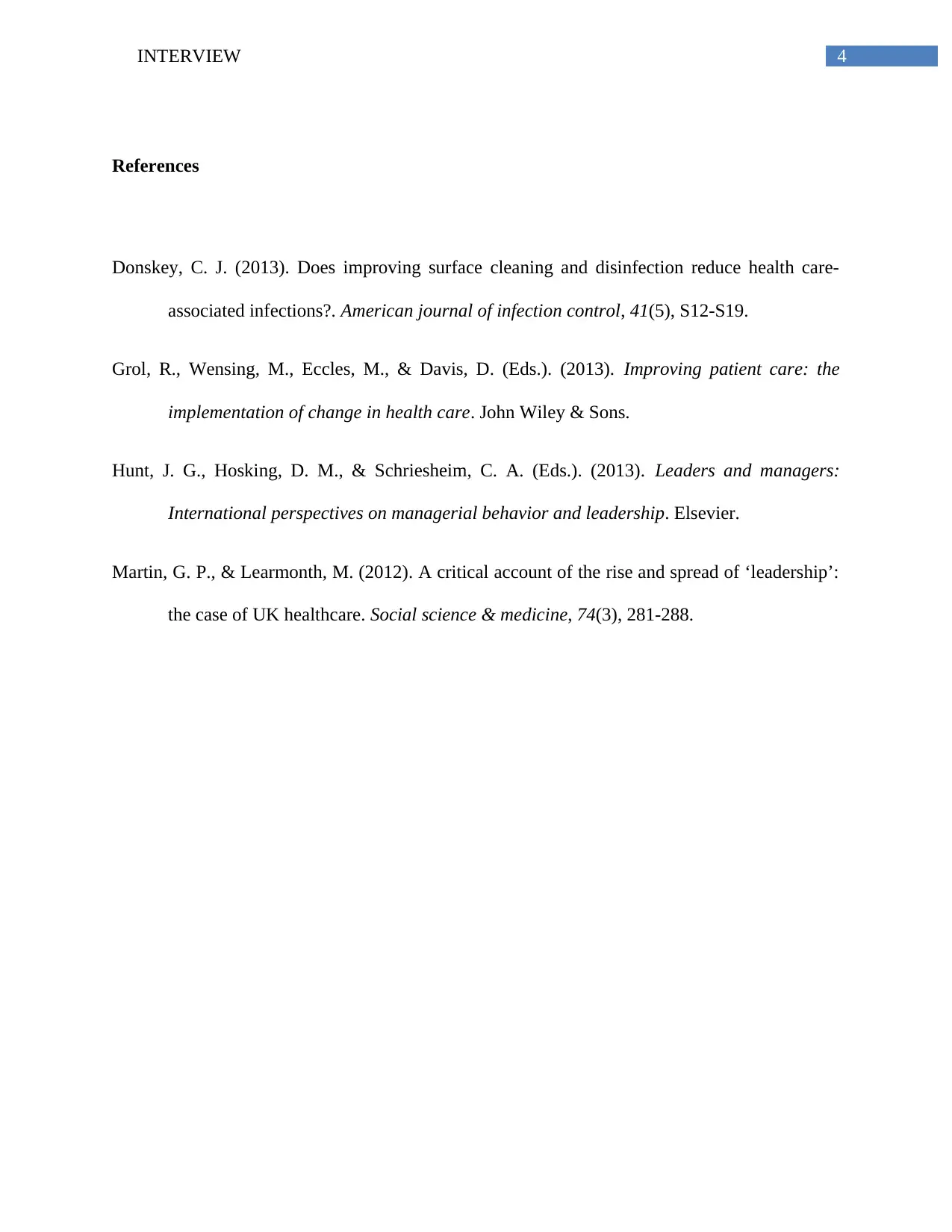
4INTERVIEW
References
Donskey, C. J. (2013). Does improving surface cleaning and disinfection reduce health care-
associated infections?. American journal of infection control, 41(5), S12-S19.
Grol, R., Wensing, M., Eccles, M., & Davis, D. (Eds.). (2013). Improving patient care: the
implementation of change in health care. John Wiley & Sons.
Hunt, J. G., Hosking, D. M., & Schriesheim, C. A. (Eds.). (2013). Leaders and managers:
International perspectives on managerial behavior and leadership. Elsevier.
Martin, G. P., & Learmonth, M. (2012). A critical account of the rise and spread of ‘leadership’:
the case of UK healthcare. Social science & medicine, 74(3), 281-288.
References
Donskey, C. J. (2013). Does improving surface cleaning and disinfection reduce health care-
associated infections?. American journal of infection control, 41(5), S12-S19.
Grol, R., Wensing, M., Eccles, M., & Davis, D. (Eds.). (2013). Improving patient care: the
implementation of change in health care. John Wiley & Sons.
Hunt, J. G., Hosking, D. M., & Schriesheim, C. A. (Eds.). (2013). Leaders and managers:
International perspectives on managerial behavior and leadership. Elsevier.
Martin, G. P., & Learmonth, M. (2012). A critical account of the rise and spread of ‘leadership’:
the case of UK healthcare. Social science & medicine, 74(3), 281-288.
1 out of 5
Related Documents
Your All-in-One AI-Powered Toolkit for Academic Success.
+13062052269
info@desklib.com
Available 24*7 on WhatsApp / Email
![[object Object]](/_next/static/media/star-bottom.7253800d.svg)
Unlock your academic potential
Copyright © 2020–2025 A2Z Services. All Rights Reserved. Developed and managed by ZUCOL.




